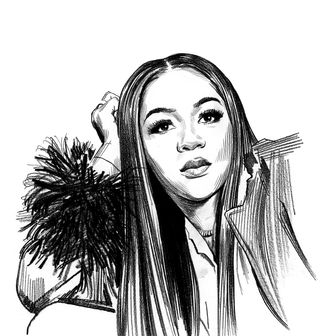
It’s 9 a.m. in Los Angeles, and Alana Mayo, the president of Orion Pictures, cheerfully arrives on Zoom for a pitch meeting with a writer. In her home office, the sun peeks through the window. Ten minutes into the chat, the writer is in tears as he talks about how much he personally relates to the story. “It’s okay, take your time,” Mayo reassures him from behind her standing desk while smiling gracefully. This is nothing new for Mayo. The powerhouse producer is used to meetings getting emotional and even enjoys it when they do — it shows how connected the writer is to the script.
The 37-year-old Chicago native moved to Los Angeles in 2006 after graduating from Columbia University in New York to work in film. Fourteen years later, she became the head of Orion Pictures, where she oversees everything from film development to postproduction and marketing. At the studio, she has green-lit Billy Porter’s feature directorial debut, Anything’s Possible, a coming-of-age story featuring a transgender teenager, and Sarah Polley’s Women Talking, a drama about Mennonite women who survived years of sexual abuse.
Prior to Orion, she was vice-president of production at Paramount Pictures, where she worked on Denzel Washington’s award-winning 2016 film Fences, and head of production and development at Michael B. Jordan’s media company, Outlier Society.
This is a glimpse of what a recent Wednesday looked like for Mayo, a day that she describes as “rare” because she mostly had meetings about the creative, not managerial, side of her job. “It was a nice little rest day from some of the business stuff and more creatively driven,” she says.
7:30 a.m. “I do the same thing every morning. I have an amazing dog, Simone, a terrier mix, and we get up and out for a walk.” Before you ask, yes, Simone has her own Instagram, where you can double-tap pics of her rocking sunglasses or staring at the sunset from their balcony. Influencer stuff. Simone lives a great life.
8:00 a.m. Before beginning her day as the boss, Mayo prioritizes her mental well-being. “I do five deep breaths, then usually get on Headspace for either a ten-minute meditation or a short daily ‘Morning Wake Up’ video.”
8:25 a.m. Even though Mayo’s working from home, she dresses as if she’s going to the office. “I happen to really enjoy getting dressed. It puts me in work mode every morning.” Today, she’s wearing her box braids pulled back and a turtleneck. She keeps her Zoom background blurred so the spotlight is all on her.
9:00 a.m. “One of my favorite ways that movies come in is when there’s a writer who has an idea. Before they even write the script, they tell us what the idea is.” That sums up this morning’s meeting: a fresh idea from a creative filmmaker who poured his personal experience into his pitch for a romance film. Shortly after he starts talking, he starts crying, and by the time he’s done, Mayo is smiling. “It’s a very heartfelt job. Ideally, what we do is supposed to create empathy. You’re supposed to understand the experience and the world of the characters onscreen.”
10:30 a.m. Anytime someone reaches out to Mayo for a mentorship conversation, she answers, “Yes!” This morning, a young filmmaker and aspiring producer who was a “superstar” on a television show Mayo previously worked on sat on Zoom with Mayo to chat about her career and upbringing and ask if she could work with Mayo again someday. The 30-minute conversation left Mayo both “moved and impressed.” Mentorship isn’t something that Mayo takes lightly. “When I was first graduating college and trying to get a foot in the door in Hollywood, I remember how unbelievably valuable those kinds of mentor conversations I had were,” she says. “I once had an agent just walk me through the track of how somebody who wants to be a development executive does that.”
11:00 a.m. The next meeting was back to filmmaking, this time for a project that was finally kicking off. Writer Kristen SaBerre is starting to write the screenplay for a project that Orion bought a while ago. Because of legal issues, it has taken a while to start, but today they’re finally signing off on the project. During the meeting, they discuss the ending of the script, making sure it works with what came before, and touch on other notes such as how mythology is used in the film. “This was a great reconnection because it’s been a really long time since we talked about the material,” Mayo says. “We always want to make sure to be aligned with our screenwriter before they go to write. It’s unfair to writers to not do a check-in before they start writing so that if there are any notes we have at the start, we can address it.”
1:00 p.m. Mayo gives herself at least 30 minutes a day without meetings. Sometimes she walks or listens to a podcast, but what’s most important is the quiet time just for her. Currently she’s loving two podcasts, The Ezra Klein Show and Pivot, which she listens to as she walks through Elyria Canyon, normally making a stop at the Self Realization Fellowship Meditation Gardens, which overlook the Pacific Ocean.
3:00 p.m. Mayo meets with a marketing executive about a future release to talk through questions like “Who’s the audience?” and “What’s the rollout going to look like?”
3:30 p.m. Moving along, Mayo has yet another Zoom meeting, a general touch-base with a producer.
4:00 p.m. As the end of the workday nears, Mayo holds her biweekly staff meeting. Normally, it’s on Fridays, so “we talk about what scripts we’re reading or what movies we’re watching over the weekend,” but she has had to reschedule this week because of a board meeting. “A huge part of everybody’s job is to look at material,” she says. “Sometimes it’s available material that’s been submitted to us as potential projects, and sometimes it’s just a great writer or a great director whose work they should be familiar with. It could also be a movie that’s a potential acquisition, and the projects are divided up amongst the team so we get on the same page about that.”
5:00 p.m. It has been a long day of Zooms, but Mayo isn’t done yet. She gets ready to head to dinner with a producer of one of her films.
6:45 p.m. At dinner at Wife and the Somm, a neighborhood wine bar and restaurant, Mayo and the producer catch up. Mayo has her daily end-of-the-day glass of wine, which “signals to my body that it’s time to wind down.”
9:00 p.m. Mayo is back home, where she spends the remainder of the day listening to music, reading, watching something (for fun, not work), or making calls to her mom or brother and sister-in-law. “I also try to FaceTime my hilarious 3-year-old nephew before bedtime and my dear friend Gabriel for both gossip and informal therapy.” If she’s watching television, she turns on Housewives; she’s currently into Potomac and Salt Lake City. “It is mindless,” she says. “I don’t have to think about it in terms of work,” and she bonds with her friends over it. “We can chat about what happened on Salt Lake City on Sunday and not be like, ‘Oh, you know, Russia’s invading Ukraine.’”
10:00 p.m. Bedtime. “I’m always in bed by 10.” Tomorrow could be another day of creative meetings or a day of managing, but each day is part of the lifetime of work she wants to do. Even though she “feels like Hollywood can be a very demoralizing career choice because it’s not necessarily a meritocracy,” she says, she’s committed to creating films that tell stories that aren’t usually onscreen — ones that, yes, might even make you cry.





